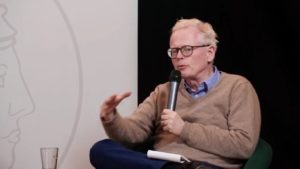 |
| Ian Johnson |
Ai Xiaoming is one of China´s leading documentary makers, and all of them are officially banned in the country.
Journalist Ian Johnson sits down with her for the
NY Review of Books and discusses how it is to make banned documentaries, and (amongst many other subjects) why China has no intellectuals.
Ian Johnson:
Ian Johnson: Your films are banned in China. Is it demoralizing that so few people can see them?
Ai Xiaoming: They are collected and shown at festivals. In the Chinese-speaking world, you can see them. Domestically, a lot of friends have seen them.
So it’s still meaningful?
Of course. I believe it has great significance. You interviewed Hu Jie and he said the same—perhaps our thoughts are the same. A documentary is important for a society’s memory. Maybe I can’t find the right reason because for me there’s no need to discuss it. It’s just an important matter.
If you can’t change society, then is your aim to record what has happened?
It’s like the Tan Zuoren or Pu Zhiqiang trials [in which a leading activist and lawyer were sentenced to jail in what widely are seen as trumped-up charges]. There is no source of information about these cases for hundreds of millions of people. I think recording this history is more important than participating in film festivals or considering foreign audiences, because a lot of historical evidence is being eliminated. It has to be preserved. ...
Are there still public intellectuals in China?
The reputation of public intellectuals stinks.
I was about to call you one!
Has China ever had public intellectuals? I don’t think so. In the feudal era there was an educated class but it was to serve power. Then came the May 4th Movement [of 1919 that promoted science and democracy, and was part of a flowering of early twentieth-century intellectual life]. But few paid attention to the independence of intellectuals. And then China’s political environment deteriorated even further. The Communists established a government, and in the 1950s Mao declared intellectuals to be the stinking ninth class or as living as si ti bu qin, wu gu bu fen [unable to move your four limbs or distinguish the five crops—to live as a parasite]. So how can you talk of having public intellectuals? There were no intellectuals.
What about after the reform era?
This word intellectual is fashionable but what does it mean? They use it to describe anyone who’s literate. If you’re in a small county seat and you’ve got an elementary school degree, you’re an intellectual. And where are they? What have they done?
Well, there are people like yourself who speak up.
I think I’m an artist, but it’s hard to say if I’m an intellectual. I’m at the front. I’m on the Web. I pay attention to intellectuals’ discussions. But I don’t do research. I document.
And what do you see?
A lot of people have retreated from engaging with society. We lack people like Liu Xiaobo who walk straight ahead, or Xu Zhiyong. Right now, walking straight ahead means walking straight to jail. So many people have ended up there that others are disengaging. They’re not walking forward.
Intellectuals face a choice. One option is to break with this [ruling] power. We have to make a clear break. This is the only way to have a position of making a thorough judgment. The other choice is to superficially work with it. But what does this accomplish? The government has already detained so many people, and sent so many NGO leaders, weiquan rights-defenders, and lawyers to prison. In this situation, if you still believe the government’s words—that you can preserve some sort of positive interaction—then you are either lying or stupid. But I don’t think it’s a question of stupidity. It’s a lie.
Much more in the New York Review of Books.
Ian Johnson is a speaker at the China Speakers Bureau. Do you need him at your meeting or conference? Do get in touch or fill in our speakers´request form.
Are you looking for more experts on political change at the China Speakers Bureau? Do check out this list.








